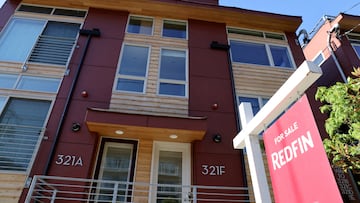Mortgage demand rises despite highest interest rates in years
The housing market has been thrown into chaos by the pandemic and many buyers are considering adjustable-rate mortgages.


Interest rates continue to rise across the country as the effects of sustained inflation are felt, sending the cost of mortgages soaring.
Data from the Mortgage Bankers Association (MBA) released on Wednesday found that the average contract rate on a 30-year fixed-rate mortgage rose to 5.37% for the week ending 22 April. This is the most popular type of home loan in the United States and it has risen to the highest level since June 2009.
However while the interest rates for some have risen sharply, many prospective home-owners are looking to reduce the initial monthly costs by opting for an alternative housing loan.
Related news
Adjustable-rate mortgages are on the rise
Fixed-rate mortgages are very expensive at the moment so many buyers are considering adjustable-rate mortgages (ARM), which offer lower initial rates than fixed-rate loans. In contrast to the fixed-rate mortgages, the current average interest rate for ARMs is 4.38%. But the saving is not permanent, and the ARM will be altered to reflect the contemporary market conditions.
Joel Kan from the Mortgage Bankers Association explains: “You have double the number of borrowers out there applying for ARMs in the last four months because of how quickly the rates have come up.”
“Clearly people are looking for other options when it comes to financing their home, because they are competing with other borrowers and they are likely looking to secure the home that they want, given how tight housing inventory is,” she added.
Typically even an adjustable-rate mortgage will include a period of fixed-rate interest towards the start, most commonly for either three, five or seven years. But beyond that point the rate of interest levied on the payments will change in relation to a pre-agreed benchmark.
Mortgage rates rose last week, crashing refinance demand and prompting potential homebuyers to apply for riskier loan products that offer lower rates. https://t.co/hzxCRWbRIL
— NBC News (@NBCNews) April 27, 2022
What is an ARM?
Related stories
In contrast to a fixed-rate mortgage, in which the interest rate remains the same throughout the agreed loan period, adjusted-rate mortgages will change during the course of the agreement. Lenders typically charge a lower initial interest rates for ARMs, making it a more affordable option for first-time homeowners.
Furthermore, while the interest rates can fluctuate in future there are caps that prevent a sudden increase or decrease. There is also a lifetime maximum cap.
However these caps are usually fairly broad and does not remove the risk of facing sky-high interest rates in future. A typical lifetime cap of 5% could still mean that your affordable 4.38% ARM ends up close to 10% further down the line.